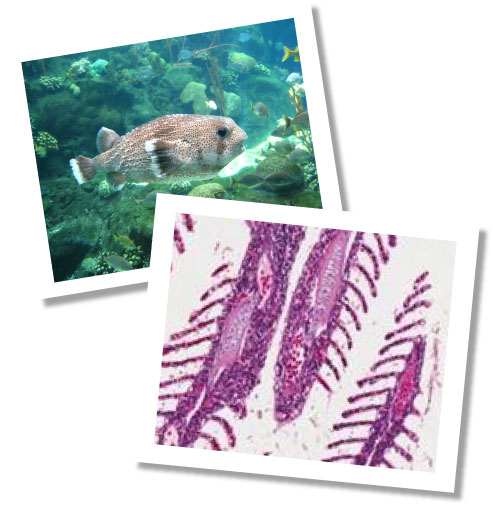Course Information
Fish and Aquatic Invertebrate Histology teaches basic interpretation of the normal histology (fixed tissue microanatomy and physiology) of fish, bivalves, and corals and introduces common histopathologic (disease) findings.
Course Syllabus
Course Number: FAS 6256 (3 credits)
Format
16 weeks: 12 Learning Modules accessed through E-Learning web site via Canvas; asynchronous access to material.

Course Objectives
This course is intended to introduce the basic histology of clinically normal fish, bivalves, and corals, and to demonstrate common histopathology of diseased specimens. We include striped bass, pinfish, and common carp as our fish models, but other species may be used or substituted as needed. Bivalve models will include economically important species and coral species will vary.
A teaching digital slide set will be available with online access and use will be described by way of tutorial and a scheduled online discussion period. Additional slides and digital images will be made available as per each instructor. Weekly online discussions are scheduled to review lectures and associated materials for that week and to examine digital slides. It is important that students keep up with each module and assignment to optimize the learning experience.

Upon completion of this course, students are expected to:
- Be familiar with, and describe basic routine histological processing
- Understand how gross anatomy correlates with microscopic anatomy, explain the relevance of histology for both research and diagnostic work
- Identify normal microanatomical structures and their functions for a number of different aquatic vertebrate and invertebrate species
- Understand common physiological and pathophysiological processes and how they alter microanatomy
- Learn how to approach the microanatomy of other species based on similarities and differences between those studied in the course.
Course Topics
- Finfish: Basic Biology, Necropsy and Processing.
- Pathology and immunology
- Response to injury and neoplasia
- Skin, Gills, and Psuedobranch
- Musculoskeletal System
- Finfish Nervous System
- Hematopoietic, Circulatory, and Excretory Systems
- Digestive System and Swim Bladder
- Endocrine and Reproductive System
- Mollusk and Crustacean: Anatomy, Physiology, and Histopathology
- Coral and Horseshoe Crabs: Anatomy, Histology and Representative Diseases

Registration Information
How to Register
UF Students: This course is departmentally controlled so you must contact the department coordinator and pay the current UF cost per credit hour. Students should be in good standing. For further information or questions, please contact the SFFGS academic support services at ffgs-academics@ifas.ufl.edu.
- Undergraduate Course Number: FAS 4932 (3 Credit)
- Graduate/Professional Course Number: FAS 5015 (3 Credit)
Non-UF students: Non-UF students will need to register as a Non-degree student (and a UF transcript will be created with your grade upon completion of the course). Non-degree students can be currently enrolled at another educational institution or not (ex: post-baccalaureate). Please complete the Non-Degree Registration Request form and select “COLLEGE OF AGRICULTURAL AND LIFE SCIENCES” from the College drop-down menu. Questions regarding registration should be directed to ffgs-academics@ifas.ufl.edu.
Registration Cost
Registration costs for UF students follow the standard tuition and fee rate of the University. Costs for non-UF students are detailed here. Registration includes access to the course materials (lectures, reading material, discussion sessions, etc), tuition, and fees. Students are responsible for any other costs (ex: microphone headsets are required for most courses).
Registration Deadline
Note: This class has limited enrollment and may fill up prior to the end of drop/add so we suggest registering early.
Registration information for dates for the University of Florida can be found here.
Please note start date on course registration website.




